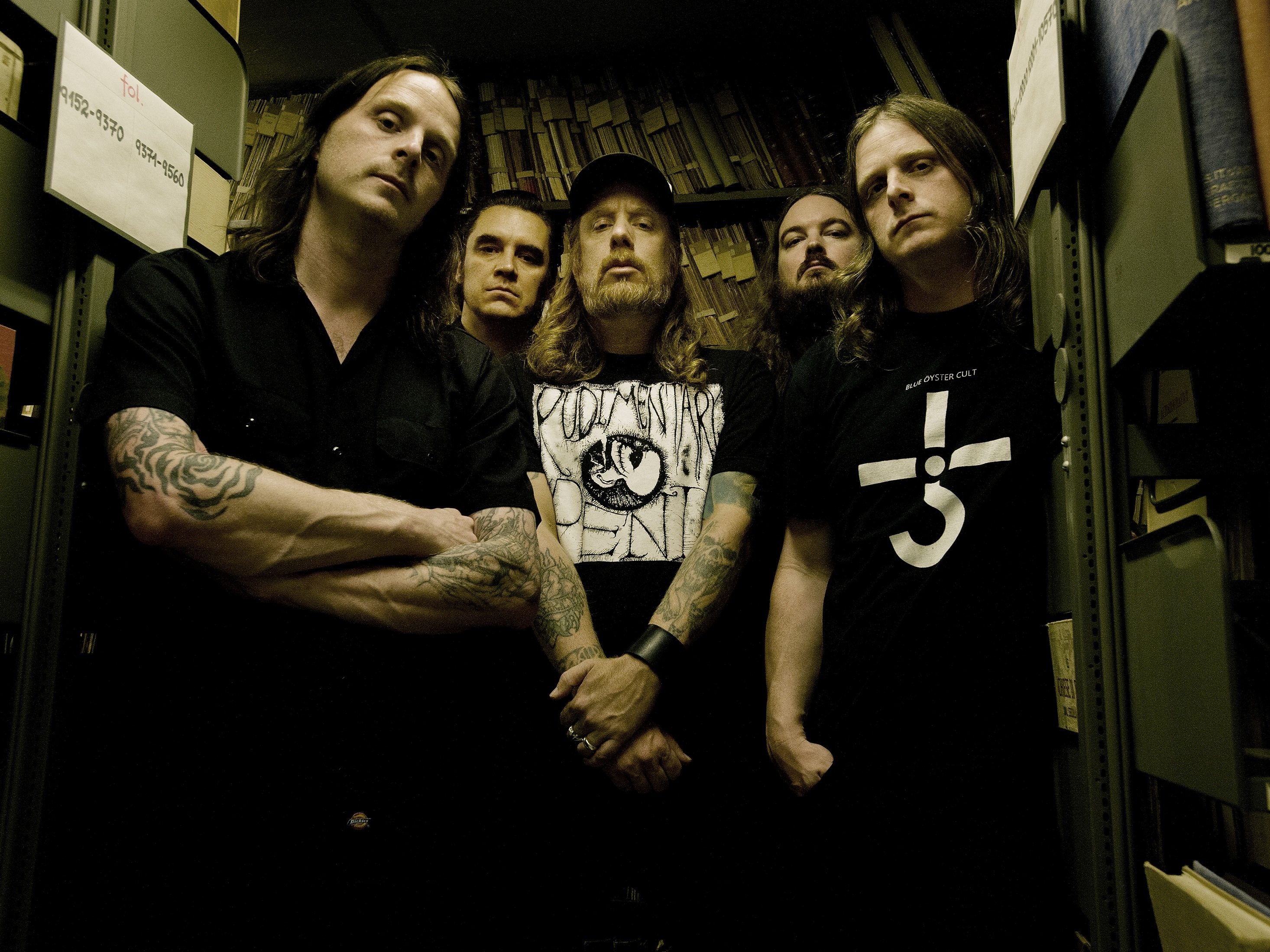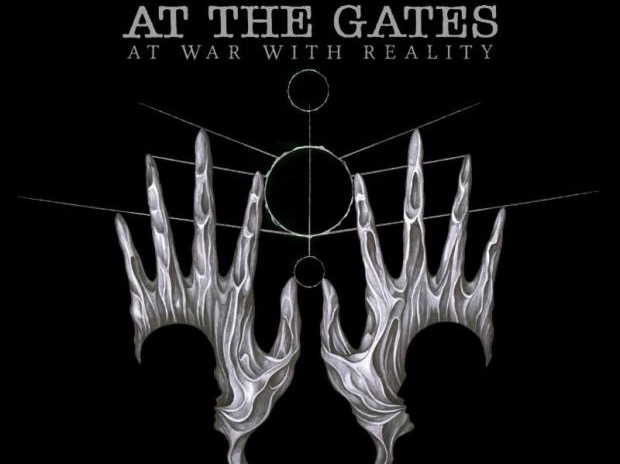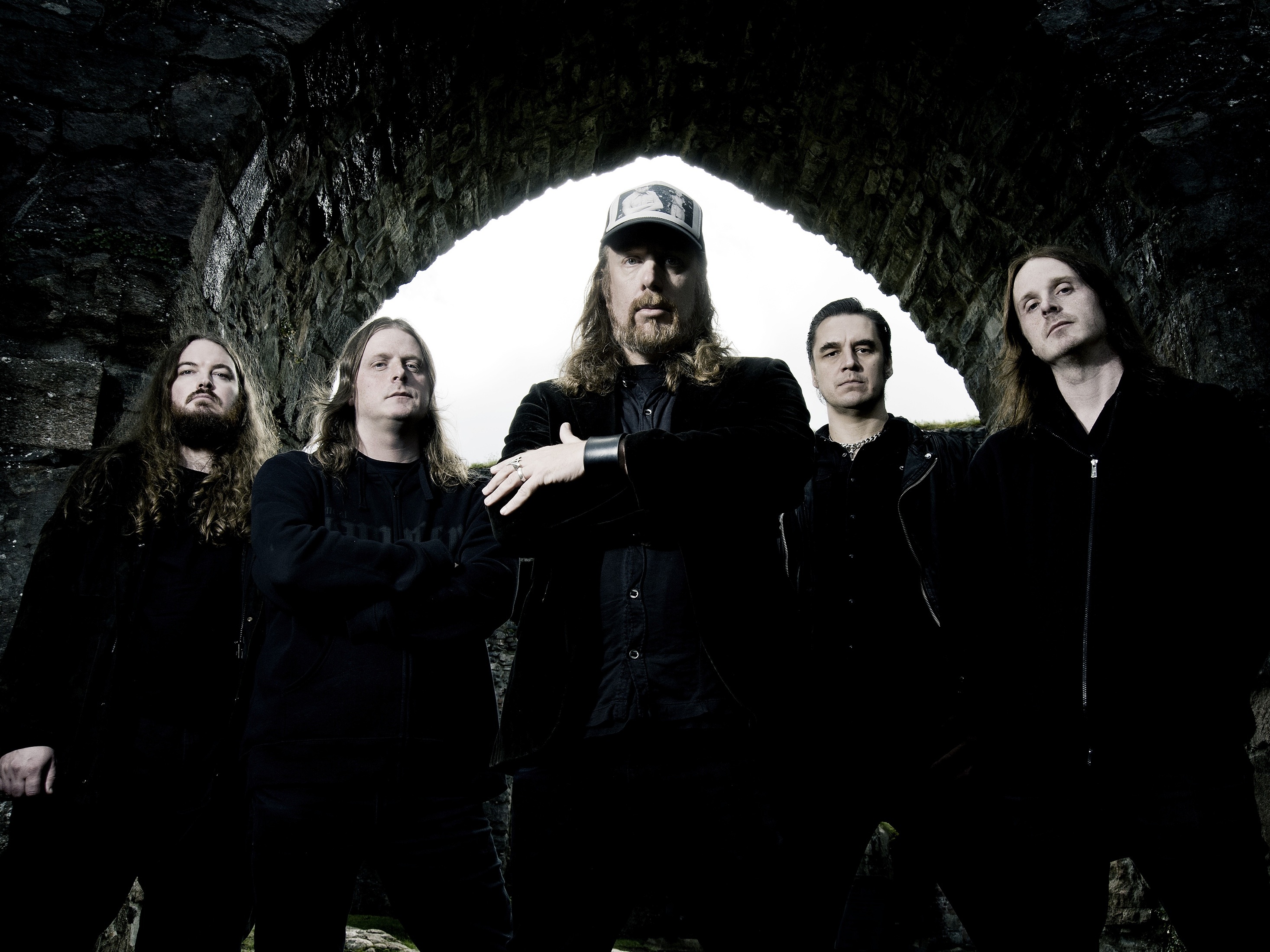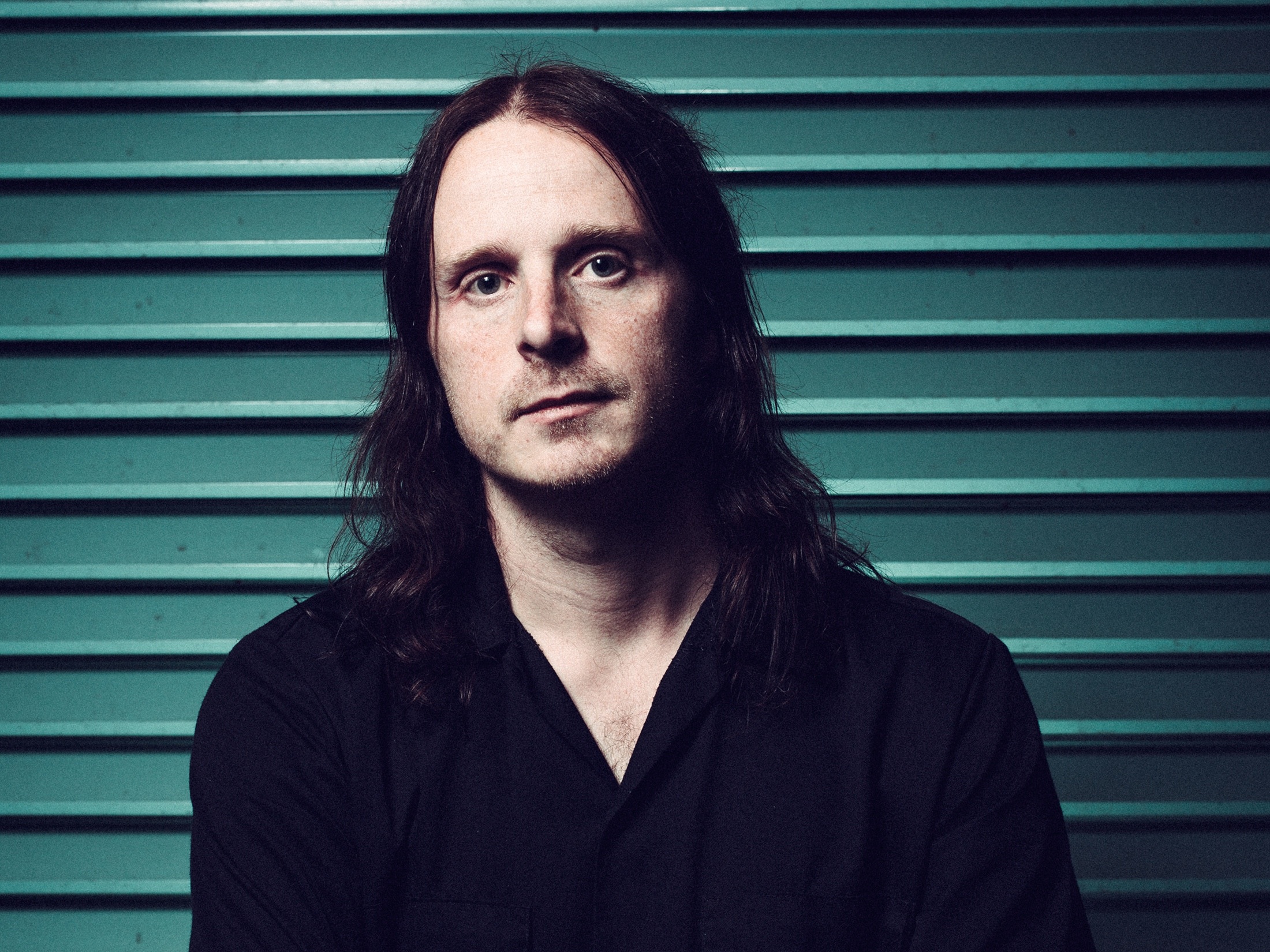At The Gates' Anders Björler talks guitar
The trailblazing player talks new album and Swedish death metal

Interview: At The Gates' Anders Björler talks guitar
Over the course of four albums, At The Gates not only changed death metal, they changed metal. Formed in Gothenburg in 1990, they pioneered a melodic death metal sound that hasbeen taken not merely as an inspiration by countless acts, but as a template to be riffed on shamelessly. While their Gothenburg comrades In Flames, Dark Tranquillity and Soilwork were also infusing their riffs with melody, At The Gates were the most influential and important band to come out of the city.
They split up in 1996, after the release of their masterwork Slaughter Of The Soul, but are back with At War With Reality. Picking up where Slaughter... left off, it sees Anders Björler and Martin Larsson trade hyper-kinetic death metal riffs juiced up and informed by Tchaikovsky-esque, Wagnerian bombast. No, seriously. But for all his six-stringed victories, Björler doesn’t see himself as a guitar hero. He’s all about the songs.
From the outside, it looked as though the reunion was initially just for a few shows; when did you start writing the new album?
“We started with the reunion in 2008, and back then it was enough. We’d see each other, tour the world, play the old songs, especially for the fans who hadn’t heard it back in the day. Then when a couple of years passed we missed the creative side... and that’s a big part of you as an artist. I like creating music. Last year, maybe May, after I finished my instrumental solo project I got in a metal mood again, so I tried – with At The Gates at the back of my mind – to write something, and ended up writing The Book Of Sand (The Abomination).
"That was the first track I wrote, I sent it to Tomas [Lindberg, vocals] and Jonas [Björler, bass and Anders’ twin brother] first, to get their reaction, and they were all ‘woo-hoo!’ The rest is history... We wrote some more, three or four tracks, and thought ‘Wow! This is going to be an album!’”
Were there any song ideas left over from the old days that you used here?
“Nothing from At The Gates. That was such a long time ago, almost 20 years ago... maybe a
skeleton of an idea that was supposed to be for The Haunted [Anders’ former band] but in a reworked fashion. Apart from that, it was a clean slate, starting afresh.”
Did you learn much from your solo project, Antikythera, that you took into the songwriting for At War With Reality?
“I guess everything you do influences you and affects you somehow. I tend to divide the different things in my life but everything you do helps the other stuff, even if it is a contrast. I wanted to do that instrumental thing mainly because we did The Haunted album //The Unseen// which was, to me, a compromise, getting in between very aggressive metal and at the same time trying to do some more progressive mellow stuff. I like it, but it didn’t work for everybody.”

The comeback album
Did you feel any pressure writing this record?
“We weren’t super-anxious or anything, but there was a feeling, like a fun buzz in the stomach, not a worry but more anticipation, I guess. I knew I could write this. We knew we could pull this off. But we were excited at the same time.
"This was six months before anyone knew about it. We started in May and the world didn’t know until January. It was this secret society; just the band and maybe immediate family and close friends knew.”
Were you checking into rehearsal spaces under false names, wearing disguises?
“We didn’t rehearse... not until the album was written. Technology has helped; with computers and stuff, we make good sketches [of songs] and I’ll send it, email, Dropbox or whatever. Since Adrian [Erlandsson, drums] is in London, it is hard to get together and rehearse. It’s all about the internet nowadays.”
It makes it a lot easier for people to collaborate – they needn’t be in the same continent to share ideas...
“Yeah, back in the day we had to meet in the rehearsal room, we had to play it through to learn the songs, and then we could put it on a tape recorder. There was a lot more work back then. [With] the bad sound in the rehearsal room, you couldn’t hear what you were doing until you recorded it.”
Does the song always start with a riff?
“My writing is more song-based. I wouldn’t send out anything unfinished, so I would have a verse, a pre-chorus and a chorus, a solo maybe, and an alternative part, or whatever. I would have as much as possible before sending it out to the other guys.
"Jonas [Björler, bass and Anders' twin brother] helped me out. He wrote some riffs. He had a regular day job during the whole process. He didn’t have all that time and when he got home he was really tired, but he did, like, 30 per cent. He was more riff-based. I took some of his ideas and threw them into mine.”
How would you compare your playing style with fellow guitarist Martin Larsson’s?
“It’s pretty similar. We both grew up listening to the same bands. We all have the Metallica/ Slayer background, and we all loved death metal. We met him early through tape trading, and then in early At The Gates when he joined in ’93, playing the old stuff, I’d say it’s pretty similar. He is not a solo player at all; that might be the only difference, really.”

Gothenburg melodic death metal
Why did the Gothenburg death metal sound develop so melodically, while Stockholm’s scene was more savage and atonal?
“The death metal came from Autopsy, Morbid Angel and Death, stuff like that. But the melody came a lot from Alf [Svensson, guitarist 1990-1993], and for him I guess Swedish folk music mixed with classical music, mainly Russian composers, and opera. That was a big part in creating the sound and getting a good mix into it, not only hardcore death metal. It was not classic heavy metal like In Flames; they were Iron Maiden-based, and Dark Tranquility was more German thrash – at the beginning at least.
"We had more classical, darker, more melancholic influences. I would say we were the only band like that back then. And, of course, you have Dissection, Eucharist, stuff like that; I would say that we have more in common with Dissection and Eucharist than with Dark Tranquility and In Flames.”
Do you think that Swedish death metal has that lineage that goes all the way back to Swedish folk?
“It’s a hard question. I don’t know. Yeah, I guess since all the bands we knew, like Dissection and In Flames, were inspired by Swedish folk music, and incorporating it into metal is like an continuation of that."
Which guitar players had the biggest influence on you when you were developing your style?
“For me, Yngwie Malmsteen, of course! I like his style, especially his connection with Baroque music, so that was my ultimate, not hero but inspiration. When you take the death metal out of it, that’s what you get. Apart from that, I grew up with Metallica and Slayer but they are not so much great solo players. With Kerry King it’s just cat strangulations. I would say James Hetfield, but if you took it back further even I would say that Accept were my favourite band growing up, like in ’82.”
Outside of metal, which guitarists excite you musically?
“Everybody. Outside of metal, I guess any jazz guitar player, King Crimson, the UK progressive era, maybe Allan Holdsworth. There are so many.”

Anders' technique
Are you a self-taught player?
“I’m self-taught, and I started pretty late. I picked up the guitar maybe ’89, at a friend’s house. I remember I bought my first guitar in February ’90, and we started the band in July. I hadn’t played for six months.”
That’s a sharp learning curve.
“There was a lot of practice every day and every night, so I was not so very social those couple of years. I lived in my basement, playing along to records and just practice, practice, practice all the time.”
"I have no ambition to become the fastest guitar player in the world because that’s what’s killing the music right now. It’s like a sport."
And is there any kind of practice regime nowadays for you?
“I haven’t practised since 1992. Since then I have been so active playing music. I have been rehearsing, playing live and recording albums, so there is no more time to practise. And that is part laziness. I have no ambition to become a shredder, but if there is a part that needs working out then of course I will set some time aside for it.
"I have no ambition to become the fastest guitar player in the world because that’s what’s killing the music right now. It’s like a sport. Who is the fastest drummer, the fastest guitar player? I’m not interested. It’s not music. I can understand the excitement about the technical gear side of things but world’s fastest drummer? It’s more like a circus act to me.”
Given that you are also a filmmaker, have you ever recorded your practice sessions and analysed your technique?
“No, I haven’t! But I was playing on a rehearsal and Jeff Loomis walked by and saw something in what I was playing. I have a very unique style, he said.I hadn’t the first clue what he was talking about, but when I do fast triplets I do the picking up-down-up/down-up- down, so I alternate with every pair of threes instead of going up-down- up/up-down-up.
"That’s a result of being self-taught. I hadn’t thought about it until he said it, and then from that day he tried to play it that way as well. He kept on practising and now he does it like that, I think. It’s pretty funny, it’s cool.”
How do you approach your solos? Do you map them out or just let them happen?
“Pretty much instinctively. It’s what’s needed. I mean, it could be very easy, one note, one or two notes; I have the mindset that a solo could be very, very simple, so I often work with very simple melodies, not so much fast picking.
"I’m really inspired by Tony Iommi from Black Sabbath; it’s more about feeling, not about speed. And that’s not so much a classical heavy metal mindset, but it’s my opinion. I’m more blues-orientated. The feeling is the most important thing.”

The future for At The Gates
Are you in a position where you want to tour this record extensively, or is it a case of picking smaller tours and one-off shows?
“We enjoyed the reunion period so much, and we kind of made a decision not to make a career out of this because we have so much fun and we love what we do together. That is more important than anything. And that is why we don’t want it to dictate our lives in any way, especially not economically.
"So we are basically keeping our day jobs just to keep this as special times when we meet and play for people, and travel the world. We are in our forties! We have families, kids, it’s hard to be away that much so we can’t tour all the year round anyway. This was kind of an important decision, to keep it fun, fresh.”
Did it surprise you that you enjoyed the reunion so much?
“Yeah, it was above everybody’s expectation. I mean, to look at it from the outside, we are a small, independent death metal band, to play at the big stage at Wacken, stuff like that is just mindblowing. So we are very humble that we can even do it. We are enjoying every second of it.”
Do you recognise the influence At The Gates have had on the metal scene?
“After the split-up and the years that followed, I didn’t pay so much attention. I guess the American scene was more based on the second wave [of Gothenburg death metal], like Soilwork and maybe In Flames. Of course, there are some bands, like Darkest Hour or The Black Dahlia Murder, but the big
bands like Unearth and Killswitch Engage were more Soilwork and In Flames to me.
"This reunionwould not have been possible without the evolution after the break-up after Slaughter Of The Soul; we couldn’t do the reunion if that didn’t happen, so we are very humble to the fact that [our influence] has helped us.”
At The Gates are touring Europe now on the following dates:
4 December – London (UK) – Forum
5 December – Manchester (UK) – Academy 2
6 December – Glasgow (UK) – Garage
7 December – Birmingham (UK) – Academy
8 December Cardiff (UK) – Globe
10 December – Essen (D) – Turock
11 December – Hamburg (D) – Markthalle
12 December – Eindhoven (NL) – Metal Meeting Festival
13 December – Leipzig (D) – Conne Island
14 December – Wien (AT) – Arena
16 December – Aarau (CH) – Kiff
17 December – Munich (D) – Backstage Werk
18 December – Antwerpen (B) – Trix
19 December – Cologne (D) – Essigfabrik
20 December – Berlin (D) – Postbahnhof
Jonathan Horsley has been writing about guitars and guitar culture since 2005, playing them since 1990, and regularly contributes to MusicRadar, Total Guitar and Guitar World. He uses Jazz III nylon picks, 10s during the week, 9s at the weekend, and shamefully still struggles with rhythm figure one of Van Halen’s Panama.


